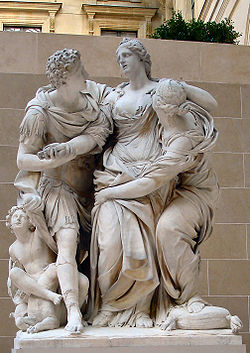
Arria
Encyclopedia

Ancient Rome
Ancient Rome was a thriving civilization that grew on the Italian Peninsula as early as the 8th century BC. Located along the Mediterranean Sea and centered on the city of Rome, it expanded to one of the largest empires in the ancient world....
. Her husband Caecina Paetus
Caecina Paetus
Caecina Paetus was condemned to death on a charge of disloyalty by the emperor Claudius in 42 AD. He chose to commit suicide rather than face the emperor's wrath...
was ordered by the emperor Claudius to commit suicide for his part in a rebellion but was not capable of forcing himself to do so. Arria wrenched the dagger from him and stabbed herself, then returned it to her husband, telling him that it didn't hurt ("Non dolet, Paete!"). Her story was recorded in the letters of Pliny the Younger
Pliny the Younger
Gaius Plinius Caecilius Secundus, born Gaius Caecilius or Gaius Caecilius Cilo , better known as Pliny the Younger, was a lawyer, author, and magistrate of Ancient Rome. Pliny's uncle, Pliny the Elder, helped raise and educate him...
, who obtained his information from Arria's granddaughter, Fannia
Fannia
Fannia is notable as the granddaughter of the well-known Arria Major.Fannia is recorded in the writings of Pliny the Younger as a woman of fortitude and respectability.As with her grandmother, Fannia is described as a political rebel in her own right...
.
Pliny records that Arria's son died at the same time as Caecina Paetus
Caecina Paetus
Caecina Paetus was condemned to death on a charge of disloyalty by the emperor Claudius in 42 AD. He chose to commit suicide rather than face the emperor's wrath...
was quite ill. She apparently arranged and planned the child's funeral without her husband even knowing of his death. Every time she visited her husband Arria told him that the boy was improving. If emotion threatened to get the better of her she excused herself from the room and would, in Pliny's words, "give herself to sorrow," then return to her husband with a calm demeanor.
After the rebellion against Claudius
Claudius
Claudius , was Roman Emperor from 41 to 54. A member of the Julio-Claudian dynasty, he was the son of Drusus and Antonia Minor. He was born at Lugdunum in Gaul and was the first Roman Emperor to be born outside Italy...
led by Lucius Arruntius Camillus Scribonianus
Lucius Arruntius Camillus Scribonianus
Lucius Arruntius Camillus Scribonianus was a Roman usurper who attempted to overthrow the newly installed Emperor Claudius in 41 CE.- Career :...
in 42. AD, Scribonianus was killed and Caecina was taken to Rome as a prisoner for conspiring with him. Arria begged the captain of the ship to allow her to join him on board. She claimed that if a consular Roman man was allowed slaves to take care of him, then she should save them the trouble and look after him herself. The captain refused, so Arria followed the great ship in a small fishing boat all the way to Rome.
Arria openly attacked the wife of the rebellion leader Scribonianus for giving evidence to the prosecution, crying:
It was this sentence which alerted everyone to her intention of dying alongside Paetus.
"Am I to listen to you who could go on living after Scribonianus died in your arms?"
Her son-in-law, Thrasea
Publius Clodius Thrasea Paetus
Publius Clodius Thrasea Paetus, Roman senator, lived in the first century CE. Notable for his principled opposition to the emperor Nero and his interest in stoicism, he was the husband of Arria the daughter of A...
, attempted to persuade her to live, asking her if she would want her own daughter to kill herself if he were sentenced to death. Arria insisted that she would if her daughter (also called Arria) had lived as long and happily with Thrasea as she herself had with Caecina.
She was watched very closely from that point onwards but, realising this, Arria said that they could not stop her from dying. Having pointed this out she ran, head first, in to a wall and knocked herself out cold. When she came to, she cried:
"I told you I would do it the hard way if you stopped me from doing it the easy way."
Arria was eventually permitted to join her husband in a "noble death" (falling on one's own sword/dagger).

